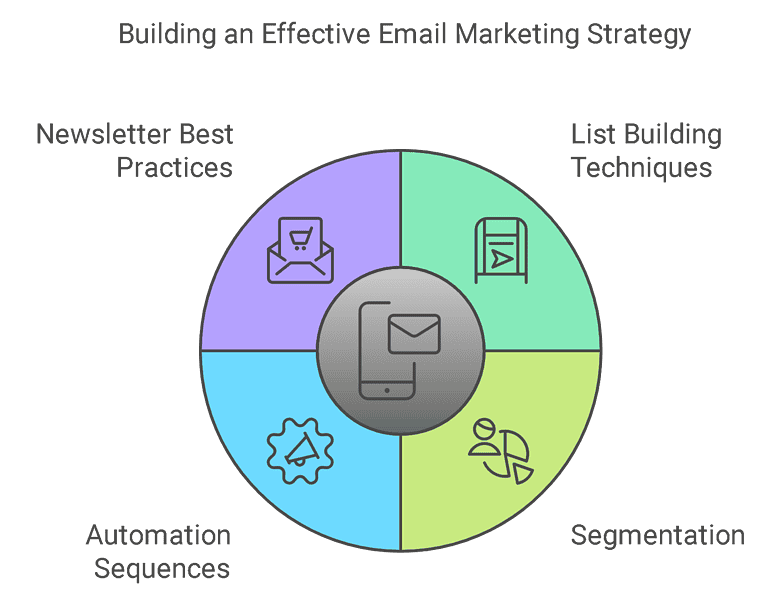Affiliate Marketing Failures: 9 Common Mistakes (2025 Fixes)
Affiliate marketing is an attractive business opportunity, but it’s important to recognize that a significant number of individuals fail in this industry. According to sources, as many as 95% of people starting out in affiliate marketing struggle to find success. This article will explore the most common mistakes made by affiliate marketers and provide insights on how to avoid them.
Key Takeaways:
- Not having a clear niche can hinder your success in affiliate marketing.
- Providing value to your audience is crucial for conversions.
- Transparency builds trust with your audience and improves conversions.
- Avoid being too salesy and focus on providing informative content.
- Only promote products that you have personally used and can genuinely recommend.
Not Having a Clear Niche

One common reason for failure in affiliate marketing is not having a clear niche. Many aspiring affiliate marketers make the mistake of trying to be everything to everyone, which ultimately leads to a lack of expertise and authority in any particular area. To succeed, it’s important to choose a specific niche and focus on building expertise and credibility within that niche.
When finding a niche in affiliate marketing, consider your interests, knowledge, and target audience. By focusing on a specific niche market, you can tailor your content and promotions to meet the needs of a specific audience, positioning yourself as an expert in that field. This not only helps you attract a dedicated following but also increases your chances of engaging with potential customers who are actively seeking the products or services you promote.
Additionally, having a clear niche allows you to differentiate yourself from competitors and stand out in a crowded market. It enables you to create targeted content that addresses the specific pain points and challenges faced by your audience, increasing the relevance and value of your offerings. By honing in on a specific niche, you can build a loyal community of followers who trust your recommendations and are more likely to convert into paying customers.
Benefits of Focusing on a Specific Niche:
- You can establish yourself as an expert in your chosen field, building trust and credibility with your audience.
- Targeted content and promotions allow you to provide valuable solutions to the specific needs and challenges of your audience.
- By focusing on a specific niche, you can differentiate yourself from competitors and stand out in a crowded market.
- A clear niche helps you attract a dedicated following of individuals who are actively seeking the products or services you promote.
- Building a loyal community of followers increases your chances of converting them into paying customers.
By finding a niche in affiliate marketing and focusing on a specific niche market, you can position yourself for success and avoid the common pitfalls that lead to failure. Take the time to research and identify a niche that aligns with your interests and expertise, and then dedicate yourself to providing valuable content and promotions tailored to the needs of your target audience.
| Not Having a Clear Niche: Common Pitfalls | Benefits of Focusing on a Specific Niche |
|---|---|
|
|
Not Providing Enough Value
One of the key reasons why many affiliate marketers fail is because they do not provide enough value to their audience. Merely promoting products without offering valuable content or incentives is unlikely to lead to conversions. To succeed in affiliate marketing, it is crucial to focus on creating informative and helpful content that provides genuine value to your audience.
One effective way to add value is by creating valuable content, such as blog posts, videos, or reviews. These resources should be informative, engaging, and tailored to address the needs and interests of your target audience. By offering valuable insights, tips, and advice, you establish yourself as a trusted authority in your niche, which increases the likelihood of conversions.
Furthermore, offering bonuses or partnering with affiliate websites that provide instant discounts can further enhance the value you provide to potential buyers. Exclusive bonuses and discounts give your audience an extra incentive to make a purchase through your affiliate links, increasing the chances of earning commissions. By going above and beyond to provide value, you differentiate yourself from other affiliate marketers and build long-term relationships with your audience.
Table: Examples of Valuable Content for Affiliate Marketing
| Content Type | Description |
|---|---|
| Product Reviews | In-depth reviews that highlight the features, benefits, and drawbacks of products help potential buyers make informed decisions. |
| Tutorials and Guides | Step-by-step tutorials or guides that provide detailed instructions on using products or achieving specific goals related to your niche. |
| Comparison Articles | Articles that compare different products or services in your niche, outlining the pros and cons of each option, will help readers make a well-informed choice. |
| Case Studies | Real-life examples and success stories that demonstrate how products or services have benefited individuals or businesses, illustrating their value. |
| Expert Interviews | Interviews with industry experts or thought leaders in your niche provide valuable insights and perspectives that your audience can learn from. |
By consistently providing valuable content and incentives, you establish yourself as a trusted resource and increase your chances of success in the competitive world of affiliate marketing.
Not Being Transparent Enough
Transparency is a vital aspect of successful affiliate marketing. Many affiliate marketers fail to realize the importance of being transparent with their audience. Failing to disclose affiliate links can erode trust and credibility, leading to lower conversions. To build trust and establish yourself as a reputable affiliate marketer, it is crucial to be upfront and honest about your affiliations.
When incorporating affiliate links in your content, clearly communicate to your audience that you are using these links. Explain why you are promoting certain products or services and how they can benefit your audience. By being transparent about your affiliations and the reasons behind them, you demonstrate integrity and authenticity, which can go a long way in building trust.
“Transparency is crucial in affiliate marketing. Failing to disclose affiliate links can erode trust and lead to lower conversions.”
Additionally, disclosing affiliate links is also a legal requirement in many jurisdictions. By adhering to these guidelines and being transparent, you ensure compliance with the law and protect yourself from potential legal issues.
Building trust with your audience is essential for the long-term success of your affiliate marketing business. By being transparent about your affiliations and disclosing affiliate links, you can foster a genuine connection with your audience, leading to higher engagement, conversions, and ultimately greater success in your affiliate marketing endeavors.
| Benefits of Transparency in Affiliate Marketing |
|---|
| Builds trust and credibility with your audience |
| Enhances the integrity and authenticity of your brand |
| Ensures legal compliance with disclosure requirements |
| Increases engagement and conversions |
Avoiding Being Salesy in Affiliate Marketing

When it comes to succeeding in affiliate marketing, one of the biggest mistakes you can make is being too salesy in your approach. Instead of bombarding your audience with constant sales pitches, it’s important to focus on providing informative content and writing engaging copy that draws your readers in.
By creating valuable and educational content, you establish yourself as an authority in your niche and build trust with your audience. Whether it’s through blog posts, video tutorials, or informative guides, your goal should be to offer genuine value to your readers. This helps to establish a connection and make them more receptive to your recommendations.
Remember, affiliate marketing is about more than just promoting products. It’s about providing solutions to your audience’s problems and helping them achieve their goals. By adopting a helpful and informative approach, you not only increase your chances of making sales but also foster long-term relationships with your audience.
Creating Engaging Copy
One way to avoid being salesy is by writing engaging copy that resonates with your audience. Instead of using pushy sales language, focus on storytelling and highlighting the benefits and features of the products you’re promoting. Show your readers how the products can solve their pain points and enhance their lives.
Here are some tips for creating engaging copy:
- Use compelling headlines that grab attention
- Focus on the benefits and outcomes, not just the features
- Include testimonials or social proof to build trust
- Create a sense of urgency or scarcity to encourage action
By crafting copy that speaks directly to your audience’s needs and desires, you can capture their attention, engage them, and ultimately increase your conversions.
Remember, the key to success in affiliate marketing is to provide value, build trust, and engage your audience. By avoiding a salesy approach and focusing on informative content and engaging copy, you can establish yourself as a trusted authority in your niche and drive more conversions.
Not Promoting Products They Haven’t Used Themselves
One of the most critical factors in being a credible affiliate marketer is promoting products that you have personally used and can genuinely recommend. When you promote products without any personal experience, it not only compromises your integrity but also undermines the trust of your audience. Your audience relies on your expertise and honesty to make informed purchasing decisions, and promoting untested products can lead to disappointment and dissatisfaction.
To maintain credibility as an affiliate marketer, it is essential to thoroughly research and test products before promoting them. Investing your time and resources in using the products yourself provides you with valuable insights and allows you to provide genuine feedback to your audience. This firsthand experience not only enhances your credibility but also enables you to effectively highlight the features and benefits of the products you recommend.
“As an affiliate marketer, your reputation is your most valuable asset. By using products before promoting them, you demonstrate your commitment to quality and build trust with your audience.”
By using products before promoting them, you can align your recommendations with your audience’s needs and preferences, increasing the likelihood of conversions. Your personal experience adds authenticity and reliability to your promotions, setting you apart from competitors who may simply be promoting products for the sake of earning commissions. Remember, building credibility as an affiliate marketer is a long-term investment that can lead to increased trust, loyal customers, and sustainable success.
| Benefits of Promoting Products You’ve Used: | Consequences of Promoting Untested Products: |
|---|---|
|
|
Not Building an Email List

Building an email list is a crucial component of a successful affiliate marketing strategy. By capturing the email addresses of your website visitors, you have the opportunity to engage with them directly and build a long-term relationship. Here are some key benefits of building an email list in affiliate marketing:
- Direct communication: With an email list, you can send targeted messages directly to your audience’s inbox. This allows you to promote new products, share valuable content, and nurture relationships with your subscribers.
- Increased conversions: By consistently providing value through your emails, you can establish yourself as an authority in your niche and build trust with your subscribers. This, in turn, increases the likelihood of conversions when you recommend affiliate products or services.
- Website traffic generation: When you have an email list, you can drive traffic to your website by including links to relevant blog posts, product reviews, or special offers in your emails. This helps increase the visibility of your affiliate site and attract more potential buyers.
To build an email list, you can offer valuable incentives such as free e-books, exclusive discounts, or access to members-only content. It’s important to make it easy for visitors to subscribe to your list by prominently placing opt-in forms on your website and mobile apps.
The Power of Personalization
Personalization is a key aspect of effective email marketing. When you segment your email list based on subscriber preferences, interests, or purchase history, you can tailor your messages to their specific needs. This level of personalization helps to increase engagement and ultimately drive more conversions. By using software tools that automate personalized email campaigns, you can save time and still provide a personalized experience for each subscriber.
| Email Marketing Statistics | Conversion Rates |
|---|---|
| Personalized emails | 10.6% |
| Non-personalized emails | 2.7% |
As the table above shows, personalized emails have a significantly higher conversion rate compared to non-personalized emails. This highlights the importance of leveraging personalization in your email marketing efforts.
Not Diversifying Their Income Streams
Diversifying income streams is a crucial aspect of successful affiliate marketing. By promoting products from multiple companies, you reduce the risk of relying solely on one source of income. This strategy provides stability to your affiliate marketing business and opens up new opportunities for earning commissions. By diversifying your income streams, you can maximize your earning potential and create a more sustainable, long-term business model.
When you focus on promoting products from multiple companies, you broaden your reach and appeal to a wider audience. Each company you work with offers unique products and services, allowing you to cater to different customer needs and preferences. This diversity not only increases your chances of making sales but also helps you build a reputation as a reliable and knowledgeable affiliate marketer.
Furthermore, promoting products from multiple companies allows you to take advantage of different commission structures and incentives. Some companies may offer higher commission rates or exclusive bonuses, while others may provide recurring commissions or special promotions. By diversifying your partnerships, you can tap into these varying opportunities, increasing your overall earning potential.
| Benefits of Diversifying Income Streams in Affiliate Marketing |
|---|
| Reduced risk of relying on one company for income |
| Access to a wider range of products and services |
| Opportunity to take advantage of different commission structures and incentives |
| Increased earning potential and long-term stability |
Remember, as an affiliate marketer, your goal is to provide value to your audience by recommending products that genuinely meet their needs. By diversifying your income streams and promoting products from multiple companies, you can offer a wider range of options to your audience and establish yourself as a trusted resource in your niche. So, make sure to explore different affiliate programs and partnerships to diversify your income streams and take your affiliate marketing business to new heights.
Relying On Organic Traffic Only

While organic traffic is valuable, relying solely on it can limit the potential reach of your affiliate website. Paid traffic, such as social media advertising, can be a powerful way to expand your audience and increase exposure for your affiliate site. By leveraging paid traffic, you can target specific demographics and drive more traffic to your website, ultimately increasing conversions.
Social media platforms like Facebook, Instagram, and Twitter offer robust advertising options that allow you to precisely define your target audience based on demographics, interests, and behaviors. By creating compelling ad campaigns and engaging content, you can attract the attention of potential buyers who may not have discovered your website through organic search.
Furthermore, social media advertising enables you to retarget website visitors and email subscribers, reminding them of products they showed interest in. This strategy can significantly increase your chances of conversion by keeping your brand top-of-mind for potential buyers.
Benefits of leveraging paid traffic in affiliate marketing:
- Increased website exposure and visibility
- Precise audience targeting for higher-quality leads
- Opportunities for retargeting to maximize conversions
- Ability to test and optimize ad campaigns for better results
- Enhanced brand recognition and authority
By diversifying your traffic sources and incorporating paid advertising into your affiliate marketing strategy, you can tap into new audiences and expand your reach beyond organic search. With careful planning and optimization, paid traffic can be a valuable tool for driving growth and increasing conversions on your affiliate website.
| Platform | Advantages | Disadvantages |
|---|---|---|
| Massive user base and precise targeting options | Increased competition and rising ad costs | |
| High engagement rates and visually-driven platform | Limited link placement options | |
| Real-time communication and hashtag targeting | Character limitations for ad copy |
“Paid traffic, when used strategically, can be a game-changer for affiliate marketers. It allows you to reach a wider audience, target specific demographics, and retarget potential buyers, increasing the chances of conversion.”
Not Tracking Their Results
Tracking the results of your affiliate marketing efforts is essential for measuring the success of your campaigns and making data-driven decisions. By analyzing website data and measuring conversions, you can gain valuable insights into what is working and what needs improvement. Tracking results in affiliate marketing allows you to optimize your strategies and maximize your earning potential.
One of the key metrics to track is the number of website visitors, as it provides a clear indication of the effectiveness of your traffic generation strategies. Monitoring the click-through rates can help you assess the performance of your calls-to-action and promotional messages. Additionally, tracking conversion rates enables you to understand how well your marketing efforts are translating into actual sales or desired actions.
There are various tools and platforms available to help you track your results effectively. Google Analytics, for example, provides detailed insights into website traffic, user behavior, and conversion rates. You can set up specific goals and track the performance of different marketing channels, such as organic search, social media, or paid advertising. By regularly reviewing and analyzing this data, you can identify patterns, trends, and areas for improvement.
Tracking your results also allows you to make informed decisions about your affiliate partnerships. By analyzing the performance of different affiliate programs or products, you can determine which ones are generating the most revenue and which ones may not be worth your time and effort. This data-driven approach helps you prioritize your resources and focus on the strategies and partnerships that deliver the best results.
Key Benefits of Tracking Results in Affiliate Marketing
- Identifying the most effective marketing channels and campaigns
- Optimizing website performance and user experience
- Gaining insights into audience behavior and preferences
- Improving targeting and segmentation strategies
- Measuring return on investment (ROI) and profitability
| Key Metrics to Track | Explanation |
|---|---|
| Website Visitors | The number of people visiting your website provides insights into the effectiveness of your traffic generation strategies. |
| Click-Through Rates (CTR) | The percentage of people who click on your affiliate links or calls-to-action shows the performance of your promotional messages. |
| Conversion Rates | The percentage of website visitors who take a desired action, such as making a purchase or signing up for a newsletter,. |
Failing to Repurpose Content
Repurposing content is a crucial strategy that many affiliate marketers overlook. By leveraging different formats, you can maximize the value of your content and reach a wider audience. Instead of confining your content to a single medium, such as blog posts or articles, consider transforming it into videos, infographics, podcasts, or even social media posts.
Repurposing your content offers several advantages. Firstly, it allows you to engage with different segments of your target audience who may prefer consuming information in different formats. Some individuals may be more inclined to watch a video or listen to a podcast, while others prefer reading articles or viewing infographics. By diversifying the formats of your content, you cater to a broader audience and increase the visibility of your affiliate marketing business.
Furthermore, repurposing content can help you save time and effort. Rather than creating entirely new pieces of content from scratch, you can repurpose and adapt existing material. This not only streamlines your content creation process but also enables you to focus on refining the quality and effectiveness of your content.
Benefits of Repurposing Content:
- Reach a wider audience through different formats.
- Engage different segments of your target audience.
- Save time and effort by repurposing existing content.
Remember that each format may require slight adaptations to suit the medium. For example, if repurposing a blog post into a video, consider incorporating visuals, graphics, or demonstrations to enhance the viewer’s experience. Additionally, ensure that your messaging remains consistent across different formats to maintain your brand identity.
By repurposing your content and leveraging different formats, you can effectively extend the lifespan and reach of your affiliate marketing efforts, ultimately maximizing your potential for success.
| Format | Advantages |
|---|---|
| Video |
|
| Infographics |
|
| Podcasts |
|
Failing to Scale Your Affiliate Marketing Business
Scaling your affiliate marketing business is essential for long-term success. By expanding and automating your processes, you can increase your earning potential and free up your time to focus on other aspects of your business.
One effective way to scale your business is by automating processes. Identify repetitive tasks that can be automated, such as email marketing or social media scheduling. Utilize tools and software that streamline these processes, allowing you to save time and effort.
Another strategy is hiring virtual assistants. Virtual assistants can take care of various administrative tasks, freeing up your time to focus on high-priority activities. They can help with content creation, social media management, customer support, and more. Hiring virtual assistants enables you to scale your business without increasing your workload significantly.
Lastly, consider creating and selling your own products. By developing your own products or services, you can expand your revenue streams and establish yourself as an authority in your niche. This allows you to leverage your existing audience and build a loyal customer base, ultimately increasing your affiliate revenue.
FAQ
What are some common reasons for affiliate marketing failure?
Some common reasons for affiliate marketing failure include not having a clear niche, not providing enough value to your audience, a lack of transparency, being too sales-focused, promoting products without personal experience, not building an email list, relying solely on one source of income, relying solely on organic traffic, failing to track results, failing to repurpose content, and failing to scale the business.
Why is having a clear niche important in affiliate marketing?
Having a clear niche is important in affiliate marketing because it allows you to build expertise and credibility within a specific area, making it easier to attract an engaged audience and establish yourself as a trusted authority.
How can affiliate marketers provide value to their audience?
Affiliate marketers can provide value to their audience by creating informative and helpful content such as blog posts, videos, or reviews. Additionally, offering bonuses or partnering with affiliate websites that provide instant discounts can enhance the value provided to potential buyers.
Why is transparency important in affiliate marketing?
Transparency is important in affiliate marketing because failing to disclose affiliate links can erode trust with your audience. Clearly communicating that you are using affiliate links and explaining why you are doing so helps build trust and can lead to higher conversions.
How can affiliate marketers avoid being too sales-focused?
Affiliate marketers can avoid being too sales-focused by providing helpful and informative content that educates and guides potential buyers. Writing blog posts, creating video reviews, or hosting podcasts that provide in-depth information and demonstrate how products can benefit businesses are effective strategies for building trust and avoiding a salesy approach.
Why is it important for affiliate marketers to promote products they have personally used?
It is important for affiliate marketers to promote products they have personally used because it adds credibility to their recommendations. Being able to speak from first-hand experience helps build trust with the audience and increases the likelihood of conversions.
What are the benefits of building an email list in affiliate marketing?
Building an email list allows affiliate marketers to directly communicate with their audience, promote new products, generate website traffic, and maintain contact with their readers. It is a powerful marketing tool that can help increase conversions and drive long-term success.
Why is it important for affiliate marketers to diversify their income streams?
Diversifying income streams is important in affiliate marketing to mitigate risk. By promoting products from multiple companies, affiliate marketers are not completely dependent on one company for their commissions, which provides stability to their businesses and increases their earning potential.
How can affiliate marketers leverage paid traffic to increase website exposure?
Affiliate marketers can leverage paid traffic, such as social media advertising, to expand their audience and increase exposure for their affiliate site. By strategically using paid ads, they can target specific demographics and drive more traffic to their website, ultimately increasing conversions.
Why is it important for affiliate marketers to track their results?
Tracking results allows affiliate marketers to monitor key metrics such as website visitors, click-through rates, and conversion rates. This data helps identify what is working and what needs improvement, enabling them to optimize their affiliate marketing campaigns for greater success.
How can affiliate marketers repurpose their content?
Affiliate marketers can repurpose their content by turning blog posts into videos, creating infographics, or using different formats to engage different segments of their target audience. Repurposing content maximizes its value and increases the visibility of their affiliate marketing business.
Why is scaling the affiliate marketing business important for long-term success?
Scaling the affiliate marketing business involves automating processes, hiring virtual assistants, and potentially creating and selling your own products. By scaling, affiliate marketers can increase their revenue, free up time to focus on other aspects of their business, and maximize their earning potential.
Source Links

- https://blog.pics.io/why-do-affiliate-marketers-fail-13-common-mistakes-to-avoid/
- https://www.hostinger.com/tutorials/mistakes-to-avoid-in-affiliate-marketing
- https://entrepreneursunstuck.com/top-12-reasons-why-people-fail-to-do-affiliate-marketing-with-success
I’m Alexios Papaioannou, an experienced affiliate marketer and content creator. With a decade of expertise, I excel in crafting engaging blog posts to boost your brand. My love for running fuels my creativity. Let’s create exceptional content together!







